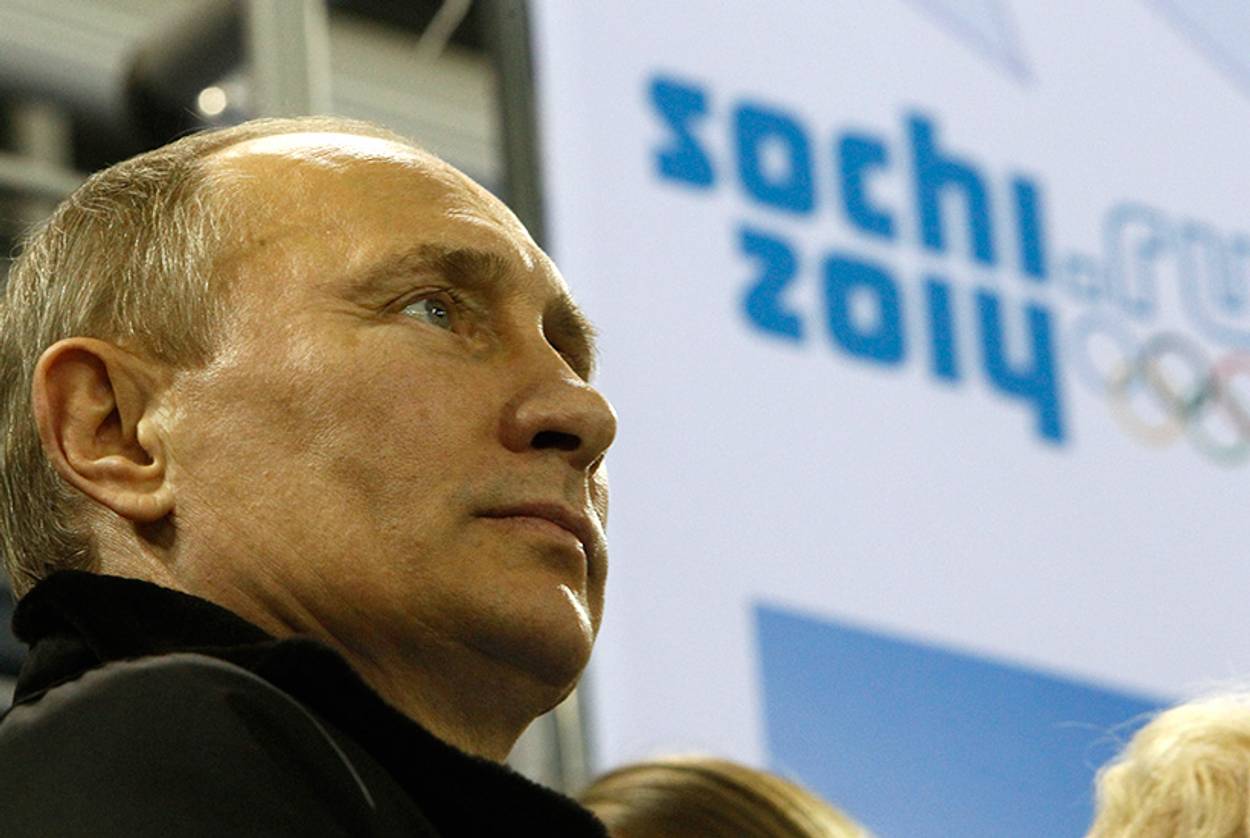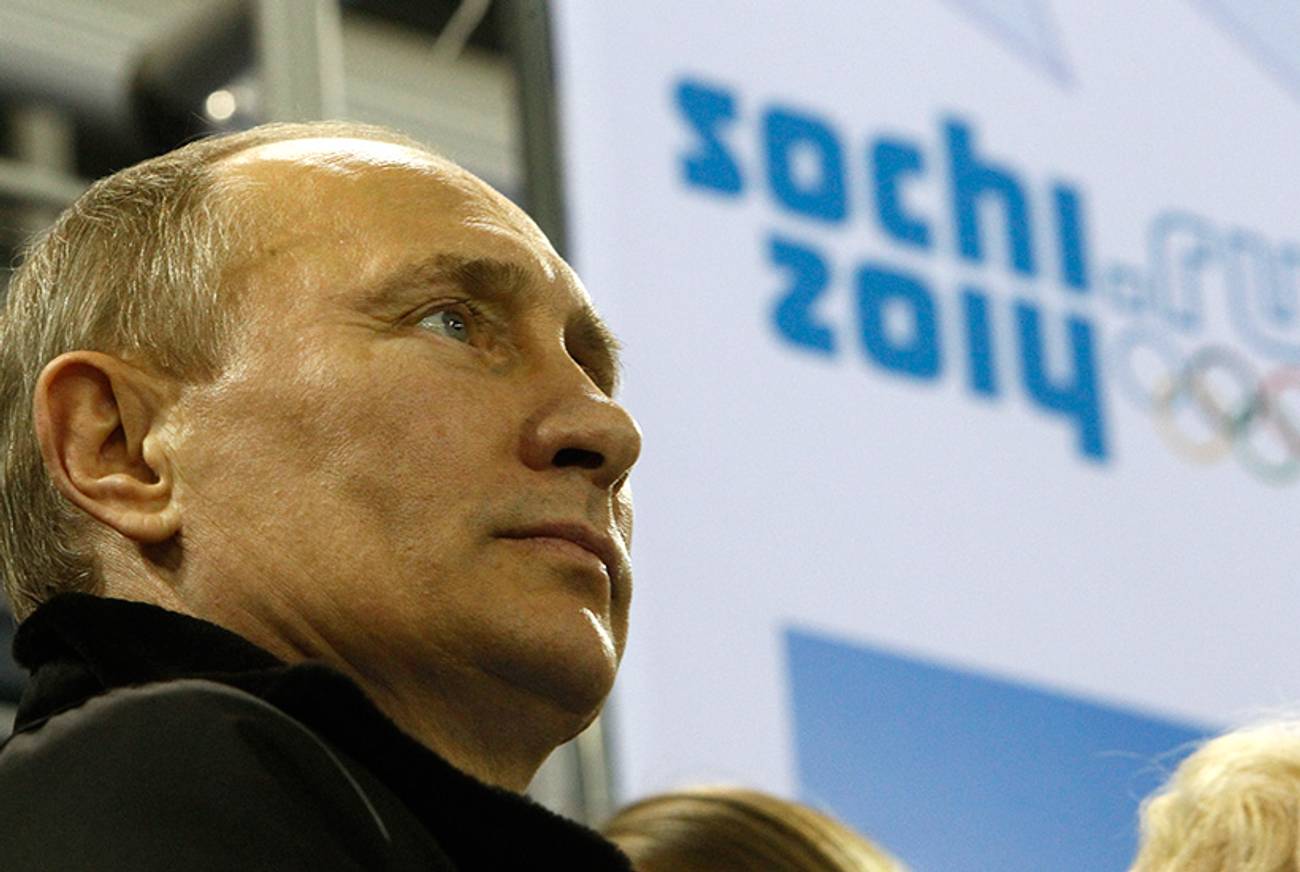Why We Won’t Be Covering Sochi
Russia is eager to hide its abominable persecution of gays behind Olympic pomp. We mustn’t let it.




In 2012, during the run-up to the summer Olympics in London, many in the Jewish community—this magazine included—were bitterly disappointed with the International Olympic Committee’s refusal to hold a moment of silence during the competition’s opening ceremony to commemorate the Palestinian terrorist attack that had claimed the lives of 11 Israeli athletes in the Munich games, 40 years earlier. At the heart of our call to action was the demand that the wanton murder of Jews not be forgotten and that the Olympiad not be turned, as it had in the past, into a spectacle too flashy and blinding to allow us a glimpse of the grim reality just outside the gates of the Olympic village. But moral principles are worthless unless universally applied, and so now is the time for us to once again stand up for the same values and ban the Sochi Olympics.
Alone among developed nations, Russia continues its consistent campaign against all vestiges of civil society. The abuses are too many to recount and include muzzling all independent media, severely limiting the ability of nongovernmental organizations to operate safely and successfully, and locking up political dissenters on trumped-up charges. These assaults on liberty are troubling in and of themselves, but they pale in comparison with the Russian government’s unprecedented campaign against its own gay and lesbian citizens, who are persecuted for no reason other than being who they are.
Thus far, the campaign has culminated in the vile law banning “propaganda of non-traditional sexual relations.” The amorphous wording is no coincidence: The Kremlin, most experts agree, sees the law as a beachhead in a larger attack against the gay-rights movement at large. And the government-run press has already succeeded in inciting intolerance: In 2002, 60 percent of Russians said homosexuality should not be tolerated; in 2013, the number shot up to 74 percent, among the highest in the world.
No decent human being should stand for such blatant persecution, but we Jews should be tenfold as sensitive. What we’re seeing happen in Russia should remind all of us of the darkest periods in our people’s history. It should concern us, enrage us, and, most important, stir us to action.
We are not naïve. We realize that Olympic games are mighty machines, fueled by global commerce and government interests and capable of drowning out even the most persistent and just criticism. And yet none of that relieves us of the responsibility to speak up. Decades ago, this community succeeded in orchestrating a sweeping campaign for the release of Jewish refusniks, a campaign that was orchestrated largely around kitchen tables and in living rooms across America. It remains an inspiration because it proved how loud and how clear a chorus of voices all chanting the same demand can be heard. As a smiling Vladimir Putin invites the world to ignore his regime’s persecution of gay Russians, we need to be just as clear, just as loud.
How? Each of us must find a way. Rabbis should dedicate their sermons these next few weeks to educating their congregations about the full scope of the Kremlin’s abuses and stress that with Russia forcefully imposing its interests on neighbors like Ukraine, the same persecution championed by Moscow may soon be visited on millions of citizens in countries under its influence. Investors should think carefully before funneling money into Russian state-controlled endeavors. And federations should use every ounce of their political clout to make the persecution of Russia’s gays a pressing item on the national agenda.
But even those of us without any power or pedestal have a role to play here, and it’s simple and wonderfully effective. Come Friday, the most effective thing we can do to protest the Sochi Olympic is not to watch it. By turning off our TVs, we’ll be sending an unmistakable message that we wish to have no part in the Kremlin’s glories. And with all that time cleared up by not watching curling or luge, perhaps we can spend an hour or two shooting off a quick email to our local congressperson, suggesting that the travesties in Russia are of concern to us and will remain so come the next election.
On our end, we at Tablet Magazine will practice the equivalent of tuning out. For the next two weeks, we will bring you no reports of the games at Sochi. As much as we are enamored with the Olympic spirit, and as much as we would have enjoyed covering such a multifaceted and moving event, we cannot help but hear, above the pomp and the circumstance, the cries of Russia’s systematically oppressed. We wish to take no part in legitimizing the Kremlin’s predatory policies, and we hope you’ll join us in denying it the visibility and approval it so desperately craves.
***
Like this article? Sign up for our Daily Digest to get Tablet Magazine’s new content in your inbox each morning.
From the editors of Tablet Magazine.